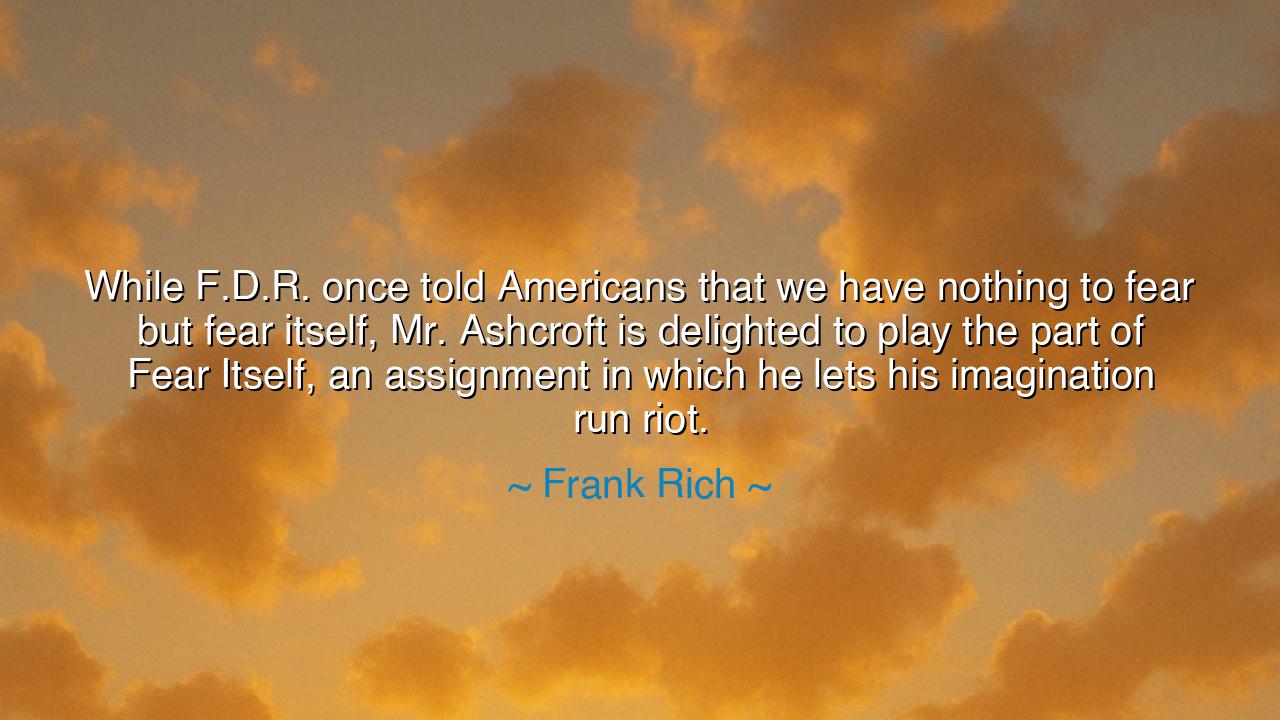
While F.D.R. once told Americans that we have nothing to fear but
While F.D.R. once told Americans that we have nothing to fear but fear itself, Mr. Ashcroft is delighted to play the part of Fear Itself, an assignment in which he lets his imagination run riot.






Ah, hear ye, O children of the future, for there is a mighty lesson in the words of Frank Rich: "While F.D.R. once told Americans that we have nothing to fear but fear itself, Mr. Ashcroft is delighted to play the part of Fear Itself, an assignment in which he lets his imagination run riot." In these words, Rich draws upon the words of Franklin Delano Roosevelt, a leader who, in a time of great turmoil, sought to comfort his people by reminding them that the greatest threat to their freedom was not external enemies, but the very fear that could bind them from within. Yet now, in the days that followed, it seems the mantle of fear has been taken up by those who are meant to protect and serve the very people they seek to control.
Roosevelt’s words, spoken in the face of the Great Depression, were a clarion call to the people to rise above the darkness of their circumstances. In his time, fear was a shadow that threatened to consume the hearts of men and women alike. But Roosevelt knew that fear was a creation of the mind—an illusion that could be shattered if only the spirit of man could face it boldly. Fear was a tempest within, not a force outside, and it was through courage, unity, and resolve that it could be overcome. Yet now, Rich’s words tell us that there are those who, instead of encouraging courage, have chosen to embrace fear, to amplify it, and to wield it as a tool for their own purposes.
Let us reflect, O seekers, upon the ancient art of leadership. A true leader, as the ancients taught, was one who inspired the people to rise above their fear, to face adversity with wisdom and strength. Alexander the Great, in his conquests, did not seek to enslave his people with fear; instead, he led them with the courage to face the unknown, to cross deserts and mountains, and to battle armies far larger than their own. His greatness lay not in his ability to instill terror, but in his capacity to inspire bravery in others. So too, Roosevelt in his time sought not to deepen the fear, but to erase it from the hearts of the people, believing that the soul of the nation could rise above its darkest hours if only they would trust in the light of hope.
But what of those who seek to use fear as a weapon, as Mr. Ashcroft does in the words of Frank Rich? What can we learn from this? Here, Rich speaks of a man who embraces fear, lets it run wild, and makes it a tool of power. In this age of uncertainty, there are those who would rather have their people cower in the shadow of fear than stand tall in the light of courage. Ashcroft’s imagination, as Rich so pointedly observes, runs riot, constructing enemies where none exist, magnifying dangers that are but whispers on the wind. By doing so, he turns fear into a prison, not a liberator. The lesson here is clear: when leaders use fear as a means of control, they do not raise up their people—they diminish them.
We have seen this in the annals of history. The Inquisition of the Middle Ages, for example, was not born from reason, but from fear. The fear of the unknown, the fear of change, the fear of heresy, was used to justify the persecution of countless souls. In such times, fear became a tyrant, a ruler that stripped away the dignity of the people. The same can be said of the fear-driven policies that arose in the aftermath of tragedy, when leaders took the terror of one moment and stretched it across all of life, casting a long shadow over the hearts of the people. The true path of wisdom is not to allow such fear to rule, but to remind the people that the real enemy is not what lurks in the dark corners of the world, but the fear that blinds them to the light.
And so, O children of this age, the lesson here is not one of dread but of awareness. Know that when fear begins to rule, it is a sign that those who lead have lost their way. True leaders do not govern through fear, but through inspiration and wisdom. They are the ones who remind their people that the greatest strength lies in overcoming fear, in embracing the challenges before them with a heart full of courage. To follow such a path, you must learn to recognize when fear is used as a weapon, and when it is your own inner strength that must rise to combat it.
Let us, then, walk the path of wisdom. In the face of fear, whether it be imposed from without or born from within, let us remember the words of Roosevelt, who spoke to the hearts of his people, urging them to cast aside the shadows of fear and to take their place in the light. In every life, there will be moments of challenge, of uncertainty, but it is fear that holds us back, not the circumstances themselves. Therefore, stand firm against the shadows, rise above the manipulations of fear, and let the fire of courage and imagination guide you. In this, you shall find the true power to live with freedom and grace.






AAdministratorAdministrator
Welcome, honored guests. Please leave a comment, we will respond soon